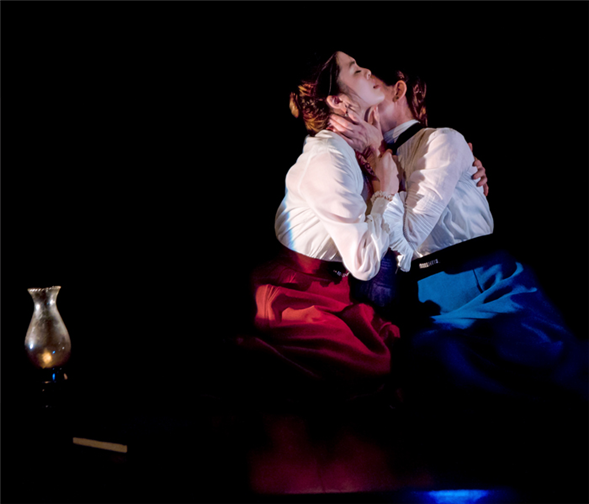Translate Page

Bull in a China Shop makes space for more women
---
Even in its opening lines, Bryna Turner's play Bull in a China Shop wears its ideology proudly on its sleeve: "You want a training ground for good pious wives? F**k that," says Mary Emma Woolley, a real-life feminist portrayed here by Enid Graham. "I'll give you fully evolved human beings."
Woolley was the president of Mount Holyoke College in Massachusetts from 1900 to 1937, and she happened to be a lesbian. Her tenure fascinates Turner, who is an alum of the college herself. "In 1901, Mount Holyoke had a queer woman president, which seemed so strange," she says. "I think if that happened now, it would be a big deal."
The real-life Woolley did indeed turn women into "fully evolved human beings": She was a suffragist, who advocated for a woman's right to education. That stance was considered revolutionary during an era when college was often seen for women as a stop on the path to marriage.
In dramatizing Woolley's life's story and accomplishments for Bull in a China Shop, currently playing in Lincoln Center Theater's LCT3 program through March 26, Turner particularly focuses on her protagonist's more than 40-year relationship with Jeannette Marks, who was chair of Mt. Holyoke's English department. Their relationship, frowned upon during that time, was for years referred to at the college as "the lavender problem."
"It always blows my mind when you realize these stories have been happening forever," Turner says. "It's so counter to the narrative that we've been given, where it maybe started happening in the 60s."
To that end, Turner wrote the first 50 pages of the play last year, or more specifically, the day after breaking up with her girlfriend of five years. "At some point over the past three years, I started looking for these stories because I thought, 'Oh I think that would be really helpful to have some examples,'" she recalls. "It's empowering to know that you're not the first person to do this. So to find these stories, I find it so profound."
While she was writing, Turner shied away from what she considered stereotypes within gay narratives. For one, there are no moments in the play where the two women are discriminated against for their orientation. Instead, Turner wanted the play to be about something more revolutionary: the everyday minutiae of queer love. "These women stayed together for 40 years: that's crazy!" she exclaims. "I was really interested in love and how do you love someone for a long time."
{Image1}
But these two women weren't just lovers. They were also thought leaders who influenced a generation of women. As she prepared the play for production, Turner was aware of the contemporary conversations around feminism, especially the concept of intersectionality and of making sure feminist movements are inclusive of women of color. That is why, though there are five women in the play, they are not all white. Turner and the play's director, Lee Sunday Evans, decided that either Woolley or Marks would have to be played by a woman of color. "This idea of queering history – and changing this idea of what the past looked like, what this story looked like, and allowing more people in – felt really important to me," says Turner.
So in the play, while Woolley is played by a white actress, Marks is played by Asian-American actress Ruibo Qian. The supporting cast is similarly multicultural. To Turner, it's a nod to the non-white feminists throughout history, whose stories she asserts have been marginalized. "I think now it reads really profoundly as this conversation between second wave and third wave feminism," says Turner. "Woolley is like, 'My body, the fact that I exist, that's the revolution.' And Marks is like, 'Yeah but try a little harder.'" In one scene, in fact, Marks says to Woolley, "You've gotten a taste of power, you've gotten a voice… and if you leave the rest of us behind I'll never forgive you."
Because Bull in a China Shop is examining history from a queer and female perspective, there are no men in it. Turner happily notes that her play more than passes the Bechdel Test. "I shared it with someone who was like, 'Even just two women talking about their careers, I don't think I've ever seen that onstage,'" she recalls. "It's so rare."
---
Follow Diep Tran at @DiepThought. Follow TDF at @TDFNYC.
Photos by Jenny Anderson. Top phtoto: Ruibo Qian and Enid Graham.
TDF MEMBERS: Go here to browse our discounts to theatre, dance, and concerts.